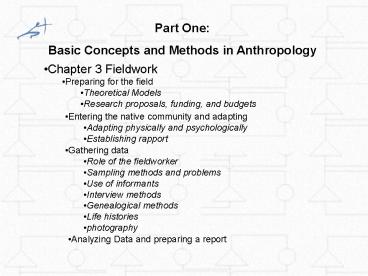Chapter 3 Fieldwork PowerPoint PPT Presentation
1 / 15
Title: Chapter 3 Fieldwork
1
Part One Basic Concepts and Methods in
Anthropology
- Chapter 3 Fieldwork
- Preparing for the field
- Theoretical Models
- Research proposals, funding, and budgets
- Entering the native community and adapting
- Adapting physically and psychologically
- Establishing rapport
- Gathering data
- Role of the fieldworker
- Sampling methods and problems
- Use of informants
- Interview methods
- Genealogical methods
- Life histories
- photography
- Analyzing Data and preparing a report
2
What is fieldwork?
How do anthropologist prepare for the field?
3
Theoretical models and their importance to
anthropology
- What is theory?
- How is theory useful?
- What can theory tell us as
- anthropologist/archaeologist?
- How do anthropologist apply theory?
4
Theoretical Approaches
- Cultural Ecology- the study of ecosystems that
include - people, focusing on how human use of nature
- influences and is influenced by social
organization - and cultural values.
- Leslie White
- Julian Steward
- Roy Rappaport
- Functionalist Model- theoretical interpretation
in - social science that search for the
interconnections - between social institutionshow they fit together
and - what they dorather that seeking causal
explanations - Bronislaw Malinowski
- A.R. Radcliffe-Brown
5
History of Theory in Cultural Anthropology
Unilineal Evolutionist (1860-1900) Lewis Henry
Morgan Savagery---Barbarism---Civilization Diff
usionist Schools (Early 20th Century) All
civilizations started in Egypt and spread out
from there Historical Particularism
(1915-1930s) Franz Boas (North America)-
beginning of ethnographic fieldwork Bronislaw
Malinowski (British) Psychological Anthropology
(Culture and Personality--1930s-40s) Uniquely
American rooted in the school the Boasian
tradition that culture is a mental phenomenon.
Popularized by Mead and Benedict.
6
History of Theory in Cultural Anthropology continu
ed
Cultural Neo-Evolutionism anti-Boasian
developed by Leslie White, Julian Steward,
Marshall Salins, and Elman Service. White
considered culture to be a system of its own
kind with system being thermodynamics (E ? T
C) Cultural Ecology Focused on the
articulation between culture and nature Julian
Steward Neo-evolution-ecological scheme
Social results of technology economical
changes thru time Bands?Tribes?Chiefdoms?States.
7
Contemplate the functions of the American fourth
of July holiday. Can you think of three ways
that this celebration meets the needs of the
members of our society individually and
collectively? Compare your list with that of a
classmate.
8
Research proposals, funding and budgets
- Research designs
- Funding
- Budgets
- Bureaucratic red tape
9
Entering the native community and adapting
- Arrival
- Adaptation period
- Physically
- Mentally
10
Adapting physically and psychologically
Culture Shock- homesickness, withdrawal,
excessive sleep, family tension/conflict,
unexplainable fits or weeping, physical
ailments, irritability. Life shock- results
from the clash of 2 distinct cultures literal
shock results. Crying, vomiting, etc This is
triggered by a single incident that one is
unprepared for
11
Identify symptoms of culture shock that you have
experienced when joining in an activity of a
subculture that is new to you. Identify culture
shock in an ethnographic account that you are
reading as part of your class reading assignments.
Note that the author often will not actually
call the experience culture shock but instead
will cite situations and feelings that
illustrate the manifestations of culture shock.
12
Establishing Rapport
13
Gathering data
- The role of the fieldworker- participant observer
- Sampling methods
- Random
- Judgment
- Problems with sampling
- bias
- Use of informants
- Interview methods
- Formal- (structured interviews) ask specific
scripted - question with each interview conducted in the
same manner. - Informal-(unstructured interviews) flows like a
conversation - allowing the interviewee to control the flow of
the - conversation. They are open ended
- Genealogical
- Life histories
- photography
14
Analyzing data
- Quantitative Methods
- Hard numbers
- Statistics
- Qualitative methods
- Life histories
- Free listing
- Check-list matrices
15
Preparing a Report and Publications
- American Anthropologist
- Current Anthropology
- American Antiquity
- Journal of Human Evolution
- And many more

